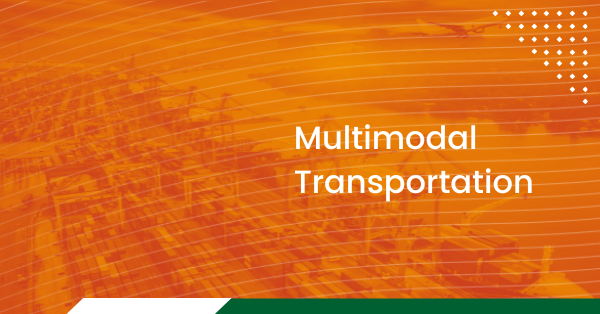Various transportation and shipping modes are available to shippers today to help move goods worldwide. But sometimes, one shipping mode is not enough to move your freight to the proper location. Perhaps, your goods are going a long way from another part of the world by ship or aircraft. The freight must be moved over the road, air, and ocean to reach the destination. As a result, shippers often need to combine transportation modes to get their goods to the right place. Logistic companies define two ways of such combination: intermodal and multimodal transport.
What is the difference between multimodal and intermodal transport?
Both intermodal and multimodal transportation suggest using two or more shipping modes together. However, there is a list of differences between intermodal and multimodal transport. When you ship intermodal, a different carrier is responsible for each part of your transportation. Consequently, you have several separate shipping bills and reports from each link in the chain. When using multimodal transport, all of your shipments are signed under a single bill of lading. Both transportation methods have benefits and drawbacks, and here we will dive deep into multimodal.
Intermodal transport
Intermodal freight is the transport of freight in a container or vehicle without handling the freight when changing modes. Several modes of transportation complete the cargo movement from origin to destination. Every method has a different transport carrier responsible for the shipment in intermodal shipping. The shipper will have several contracts with each transport carrier to handle their portion of the load. The different transportation modes of intermodal shipping can include rail, ship, and truck. Even though intermodal transport is cheaper than multimodal transport, there’s much time needed for negotiations with carriers in intermodal. Intermodal transport helps improve security, reduces damage/loss, and allows for faster transport.
Multimodal transport
Multimodal is the combination of different types of transport to move a shipment. The carrier can include trucks, trains, ships, airplanes, etc. Even though the load breaks down into different modes of transport, it still falls under a single contract/bill of lading. Companies that choose multimodal shipping can handle all shipping delays and interactions through one provider and ease the stress of communicating between different contacts. Some of the main advantages of multimodal transport are efficiency in delivery time and proficient shipment tracking.
What are the benefits of multimodal transport?
Multimodal transport can benefit many businesses that ship large amounts of freight regularly. The main reason companies prefer multimodal is that it requires less time and effort than compared to the intermodal. This is because all the shipments are under a single bill and managed by an external party. There are many reasons your company should choose multimodal transport when planning your next shipment, including:
Time savings
In multimodal transportation, one shipping provider handles the entire process. The delivery delays for your freight become shorter due to working with only one company. Multimodal transportation ensures less worrying about the shipment and faster transit times. Using multimodal transportation also results in higher productivity. When you have one person responsible for the entire transportation chain, it’s much easier to focus on the business and not spend time bouncing from one call to another.
Cost-efficiency
It may seem like picking carriers with the lowest price is more profitable. However, the lowest price is not always the best or most reliable option. Multimodal transportation is a more straightforward option to work with a third-party freight broker to coordinate shipments. 3PLs expertise can ensure you get the best rate with a reliable multimodal carrier.
Less worrying
A single carrier handles your freight door-to-door, ensuring more accessible communication and efficient tracking. When companies ship through multimodal transportation, they handle all shipping updates, delays, and interactions through one provider and contract. Partnering with one carrier responsible for your shipment allows your company to have a smoother supply chain process.
Easier Communication
When companies ship through multimodal transportation, they handle all shipping updates, delays, and interactions through one provider and contract. When you have one person responsible for the entire transportation chain, it’s much easier to focus on the business and not spend time bouncing from one call to another.
Faster Transit Options
Due to recently added restrictions on truck drivers, such as driving hours and other regulations, some longer-haul shipments are not as fast as they once were. Combining different transportation modes under one contract lets you have a piece of mind and balanced transit time. That way, you avoid drivers driving too long and bypass shipping delays. Another benefit of faster transit options is you get easier freight tracking. The opportunity to track your freight is more efficient while the shipment is moving at a faster pace.
Multimodal transport services with PLS
Ultimately, multimodal transport helps guarantee consumers on-time deliveries and valid cost savings. Whether shipping by air, rail, or barge, multimodal shipping can be your solution. PLS Logistics Services wants to make the shipping process easy for you. Contact us today to receive an efficient multimodal shipment with us!
Get a quote to connect with a broker who can coordinate your multimodal shipments.


